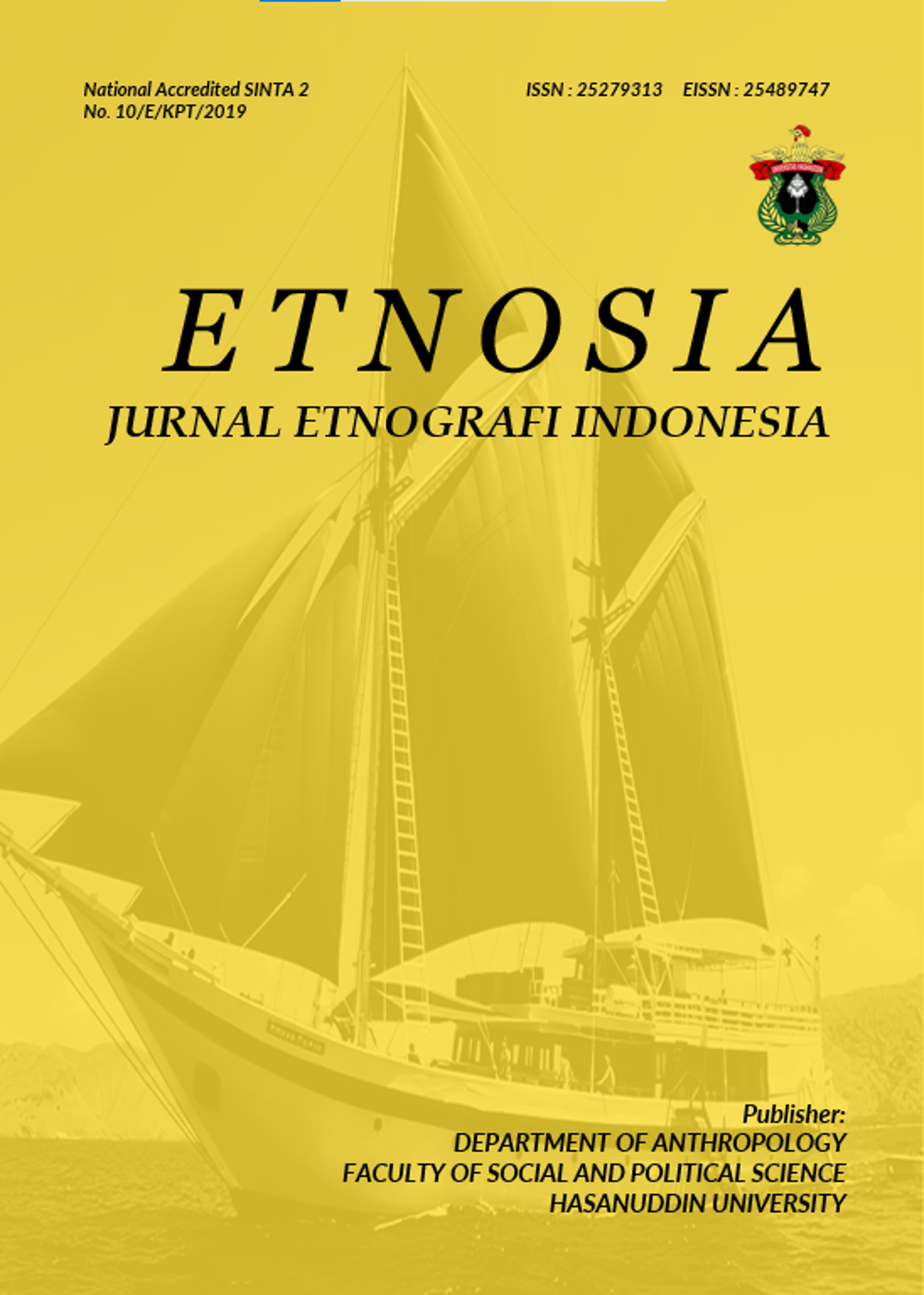Abstract
Indonesia seems to face the crisis of local language, especially in urbanization. The emergence of English as a lingua franca is undeniable to decrease the existence of vernaculars. The research aims to reveal the reason for urbanization giving the biggest impact on the Indonesian’s local language in South Sulawesi and how to maintain the use of local language is facing extinction in this century. This study applied a descriptive qualitative design by interviewing three subjects. They are lecturers and students. The interview result showed that globalization is one of the plagues that had the impact on vernaculars becoming threatened in this present day, influenced people to obey their vernaculars, and also affected the youths’ psychological order and their perception. It is due to the significant use of international or national language and the less effort from the government in maintaining the vernaculars, particularly in South Sulawesi. One suggestion can be proposed that local content needs to be involved in the Education sector e.g., intensifying vernacular use in school and family, and sustainably promoting cultural heritage to attract the society.References
Arka, I. W. (2013). Language Management and Minority Language Maintenance in (eastern) Indonesia: strategic issues. Australian National University, 7(2013), 74–105.
Budi, A. S., (2014). The development of English as a lingua franca in Indonesia and the extinction of local languages. Journal of English in Academic and Professional Communication, 1(1) 59–68
Canagarajah, A. S. (2004). Reclaiming the local language policy and practice. Reclaiming the Local in Language Policy and Practice, 9(2), 1–297. https://doi.org/10.4324/9781410611840
Cohn, A. C., & Ravindranath, M. (2014). Local languages in Indonesia: Language maintenance or language shift? Linguistik Indonesia, 32(2), 131–148.
Dharma, A. T., Lubis, W. M., & Syahra, N. A. (2018). Teenagers Cultural Values Towards Their Vernacular and Indonesian Languages. Journal of Linguistics, Literature, and Language Teaching, 2(1), 68–77. https://doi.org/10.30743/ll.v2i1.466
Ewing, M. C. (2014). Language Endangerment in Indonesia. International Journal of Education, 8 (1), 11-22
Gunantar, D.A. 2016. The impact of English as an international language on English language teaching in the Indonesian language. CIRCLE: Journal of Language and Literature, 10 (1), 141-151
Hale, K. Krauss, M. Watahomigie, L.J. Yamamoto, A.Y., Craig, C., Jeanne, L.M. and Nora C. (1992). Endangered Languages Linguistic Society of America. 68 (1) 1-42
Ibrahim, G. A. (2011). Bahasa Terancam Punah: Fakta, Sebab-Musabab, Gejala, dan Strategi Perawatannya. Masyarakat Linguistik Indonesia, 29(1), 35–52.
Idris, T. (2014). Language Policy and the Construction of National and Ethnic Identities in Indonesia. US-China Education, 4(10), 691–705.
Indrayani, L. M. (2011). Language Vitality: A Case on Sundanese Language as A Surviving Indigenous Language. International Seminar “Language Maintenance and Shift,” 31–35.
Ipnugraha, I. (2013). Pioneering of Schools with International Standards to Respond to Globalization. Journal of Education and Learning (Edu Learn), 7(3), 153–158. https://doi.org/10.11591/edulearn.v7i3.180
Johnson, A. (2009). The Rise of English: The Language of Globalization in China and the European Union. Macalester International. 22 (12), 131-168
Kachru, B. B. (1985) Standards, codification and sociolinguistic realism: the English language in the outer circle. In R. Quirk and H.G. Widdowson (Eds), English in the world: Teaching and learning the language and literatures Cambridge: Cambridge University Press.
Khader, K. T., &Hammad, U. (2017). Towards Assessing the Vernacular in the Arabic Language: A Descriptive Analytical Study. International Journal of English Linguistics, 7(5), 164-175. https://doi.org/10.5539/ijel.v7n5p164
Lauder, A. (2008). The Status and Function of English in Indonesia: A Review of Key Factors. Makara Human Behavior Studies in Asia, 12(1), 9-20. https://doi.org/10.7454/mssh.v12i1.128
Lukman. (2000). Pergeseranbahasa – bahasadaerahsulawesiselatan: kasuspergeseranbahasabugis, makassar, toraja, danenrekang. Universitas Hasanuddin Makassar.
Mulyono, (2017). The Problems of Modernity and Identity in the Globalization Era. Journal of Maritime Studies and National Integration, 1 (2), 106-111
Paauw, S. (2009). One Land, One Nation, One Language: An Analysis of Indonesia’s National Language Policy. 5(1), 2–16.
Pomeroy, B. R. (2021). Will English Destroy All Other Languages? | Real Clear Science. 1–3 http://www.realclearscience.com/blog/2016/03/will_english_destroy_all_other_languages.html
Purbo-Hadiwidjoyo, M. M. (1999). Kata Dan Makna: Teman Penulis Dan Penerjemah Menemukan Kata dan Istilah. Bandung: ITB PRESS https://www.itbpress.itb.ac.id/shop/kata-dan-makna-teman-penulis-dan-penerjemah-menemukan-kata-dan-istilah/
Rahmi, R. (2016). the Development of Language Policy in Indonesia. Englisia Journal, 3(1), 9-22. https://doi.org/10.22373/ej.v3i1.622
Rabiah, S. Development of Makassarese Language Learning Materials Based on the Character-Building Concept For 5 Th Grade Elementary School Students 1. International Journal of Academic Research. 8 (6), 32-37
Said M, Thalib, F. and Ichwan. (2007). Model Perkembangan Bahasa Bahasa Daerah Sulawesi-Selatan. 1 -11
Seidlhofer, B. (2002). Closing A Conceptual Gap: The Case for A Description of English as A Lingua Franca. International Journal of Applied Linguistics, 11(2), 133–158.
Sitokdana, M.N.N., Tanone, Penidas, T., F. Tanaem F., (2019). Digitalization of The Local Language Dictionary of Pegunungan Bintang. Procedia Computer Science 161. 49–56
Sitokdana, M. N. (2017) Mengenal Budaya Suku Ngalum Ok [Title in English: Understanding the Culture of Ngalum Ok Tribe], Salatiga: Satya Wacana Press.
Suktriayu, R.E., Kridalaksana A.H., and Hatta, H.R. (2017) “Application of Indonesian-based Paser-Indonesian Dictionary”, in Pros SAKTI (Seminar Ilmu Komputerdan Teknologi Informasi), 2 (2), 152–4.
Tondo, F. H. (2009). Kepunahan Bahasa-Bahasa Daerah: Faktor Penyebab dan Implikasi Etnolinguistis. Jurna lMasyarakat & Budaya, 11(2), 277–296. jmb.lipi.go.id › index.php › jmb › article › download%0A
Widdowson, H. G., &Kramsch, C. (2000). Oxford Introductions to Language Study-Series Editor: Language and Culture. California: University of California at Berkeley 1–71.
Widodo, H. P., & Fardhani, A. E. (2013). The language rights of indigenous languages: an approach to maintaining Indonesia's linguistic and cultural diversity. Linguistic Diversity (p. 129).
Wright, S. (2016). Language choices: Political and economic factors in three European states. The Palgrave Handbook of Economics and Language. https://doi.org/10.1007/978-1-137-32505-1

This work is licensed under a Creative Commons Attribution-NonCommercial 4.0 International License.
Copyright (c) 2021 ETNOSIA : Jurnal Etnografi Indonesia





